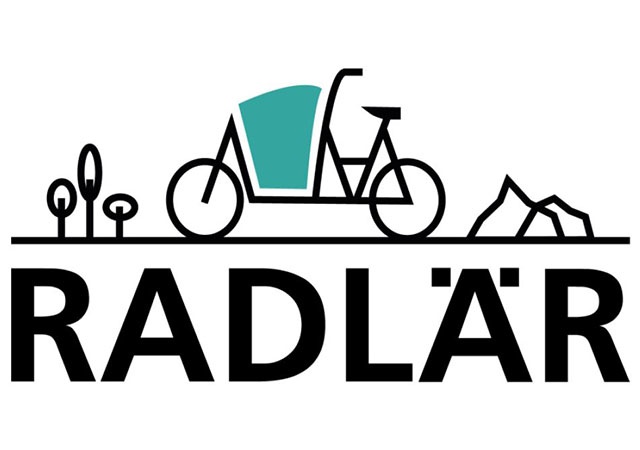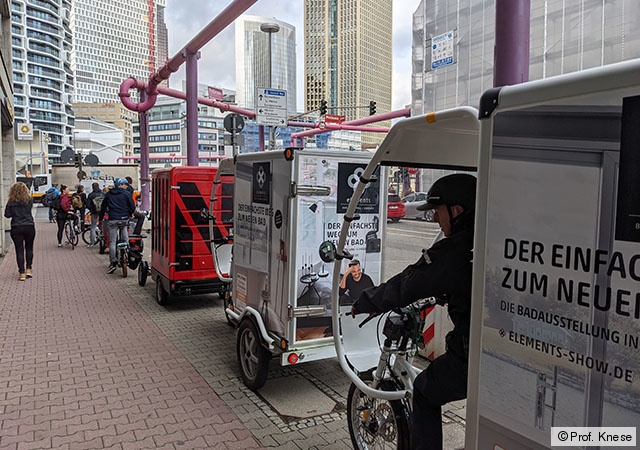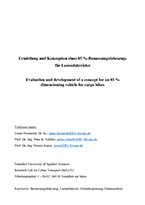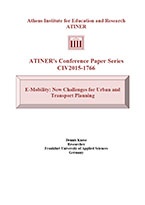Research impact statement
Sustainable mobility and logistics are my passion!
Having more than 15 years of experience in the traffic sector, I strive to develop solutions that are socially, ecologically and economically sustainable. In the Research Lab for Urban Transport (ReLUT), we address current and future challenges as we bring together a broad spectrum of expertise: Traffic planning, logistics, urban planning, social sciences, data science, computer science (AI), geoinformation, economics, and law.
We also work across disciplines regarding our teaching at Frankfurt University of Applied Sciences. When teaching and discussing with students, I place a strong emphasis on practical relevance and the use of a wide range of methods. Together with external partners from politics, business and science, we are training the specialists of tomorrow. In the future, these professionals will help us advance the necessary transformation processes.

SDG 1: Access to mobility, equal opportunities for everyone to participate in public life, reduction of social segregation through transport

SDG 9: Promotion of innovation in the transport sector, strengthening of economic performance and infrastructure through adapted traffic systems
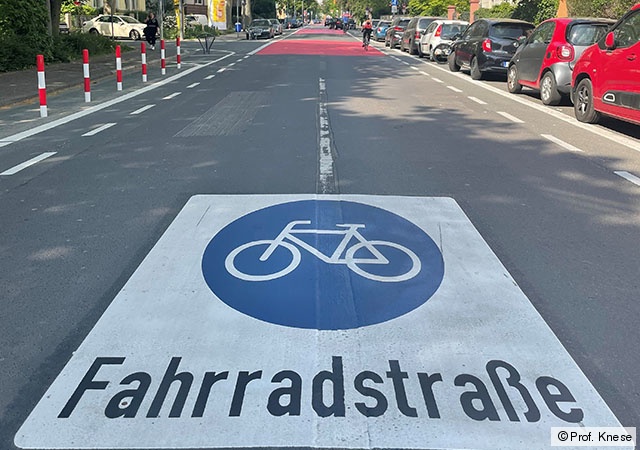
Bicycle-friendly side streets
Analysis of bicycle-friendly side streets in Frankfurt (only in German)
Bicycle-friendly side streets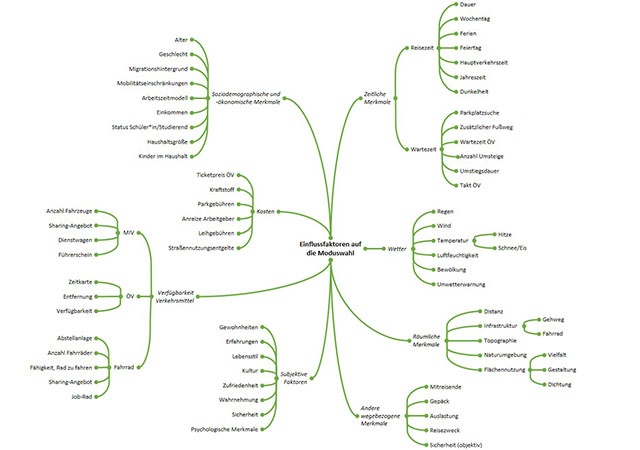
ModelRad
Status quo and development options of the data basis for the modeling of bicycle traffic
ModelRadAcademic career
Dennis Knese became Professor of Sustainable Mobility and Cycling at Frankfurt University of Applied Sciences in 2021. The professorship, which is funded by the Federal Ministry for Digital and Transport (BMDV), is a cross-disciplinary position placed in both the Faculties of Architecture, Civil Engineering, Geomatics as well as Business and Law.
Prof. Knese is a geographer and traffic planner by training with degrees from the University of Bremen and Wiesbaden University of Applied Sciences and study experience at Cardiff University.
In 2020, Mr. Knese was appointed to the Advisory Council on Cycling for the Federal Ministry for Digital and Transport, a body consisting of high-ranking representatives from politics, business, and science who advises the Minister of Transport on the mobility of the future, as one of 20 experts,.
In 2024, he was accepted into the Polytechnische Gesellschaft (Polytechnic Society) Frankfurt, which has been committed to culture, science, social affairs and a vibrant urban society for more than 200 years.
Professional experience
Since 2021: Endowed Professorship for Cycling funded by the Federal Ministry for Digital and Transport at Frankfurt UAS;
2016-2020: Consultant for sustainable mobility and development cooperation within the technical and methodological domain of the Deutsche Gesellschaft für Internationale Zusammenarbeit (German Society for International Cooperation).
2010-2016: Research assistant in the fields of electromobility, urban planning, and traffic planning at Frankfurt UAS;
2009-2010: Research associate in the fields of traffic & transportation, climate change & alternative energies, green building, and economic development with the Vancouver Economic Development Commission
Education
Prof. Knese completed his doctorate in engineering at the University of Kassel in 2018. The dissertation is titled “Integration der Elektromobilität in die Stadtplanung und Straßenraumgestaltung – Lösungsansätze für Strategien, Konzepte und Maßnahmen (Integration of electromobility into urban planning and street space design - solution approaches for strategies, concepts, and measures)".
Master's degree in 2009: Environmental management and iInfrastructure planning in metropolitan areas, focusing on traffic and urban infrastructure; University of Applied Sciences Wiesbaden, Germany; incl. semester abroad as part of the master program Transport Planning, Cardiff University, Wales;
Bachelor's degree in 2007: Geography, focusing on human geography; University of Bremen, Germany
Supervision of theses
Last supervised master’s theses:
Halit Aliu: Umsetzung der Qualitätsstandards und Musterlösungen für das Radnetz Hessen – am Beispiel von Fahrradstraßen (Implementation of quality standards and model solutions for the cycle network Hesse - using cycle lanes as an example)
Jana Beuß: Barrierefreie Erschließung des S-Bahnhofs Eschborn-Niederhöchstadt (Barrier-free development of the Eschborn-Niederhöchstadt Suburban Train Station)
Sarah Sazgari: Pedal Power and Footsteps: Developing a Sustainable Neighborhood by Empowering Active Mobility in Niederrad
- Sarah Dobjani: Exploring the Impact of Transitioning to E-Buses on the Public Transport Workforce - A Case Study of Metrobús Line 3 in Mexico City
- Erik Eckhardt: Analyse wirtschaftlicher Nutzungsmodelle für den Einsatz von Mikrodepots (Analysis of economic usage models for the utilization of microdepots)
- Theo Wolf: Radverkehrskonzept für das Gewerbegebiet Eschborn-Süd (Cycling concept for the Eschborn-Süd industrial park)
- Alexander Klöß: Öffentlichkeitsarbeit und Kommunikation bei verkehrsplanerischen Umgestaltungen (Public relations and communication in connection with reorganizations regarding traffic planning)
- Jana Busse: Einfluss von radverkehrsfördernden Maßnahmen auf die Verkehrssicherheit (Influence of measures to promote cycling on road safety)
- Canathy Wong: Rediscover the Forgotten Puzzle Piece: Rejuvenating the Connection between Großauheim and Hanau City Centre by Urban Greenways
- Nils Nico Bursch: Betriebliches Mobilitätsmanagement am Beispiel der Flughafen Düsseldorf GmbH (In-house mobility management using the Flughafen Düsseldorf GmbH as an example)
- Pascal Benatzy: Traffic turnaround in Hesse - Concept for the use of geodata for a cycle path infrastructure
- Swikar Patil: The present and potential role of cargo e-bikes for last-mile deliveries in European cities
- Karim Mohamed Mohamed Ismail Khalil: Empfehlungen für Radschnellverbindungen im Rhein-Main-Gebiet (Recommendations for fast cycle connections in the Rhine-Main Area)
- Nazia Nawrin Hossain: Increasing Cycling as a non-motorised mode in Dhaka, Bangladesh
- Erik Eckhardt: Voraussetzungen für den Einsatz von Elektrofahrzeugen in Schwellen- und Entwicklungsländern (Prerequisites for the use of electric vehicles in newly industrializing and developing countries)
Key publications
EN Grundlagen zu Logistik und Wirtschaftsverkehr mit Lasten- und Transporträdern
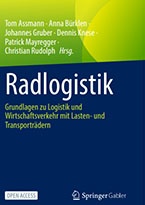
Assmann, Tom; Bürklen, Anna; Gruber, Johannes; Knese, Dennis; Mayregger, Patrick; Rudolph, Christian (2024): Radlogistik. Grundlagen zu Logistik und Wirtschaftsverkehr mit Lasten- und Transporträdern. Springer. ISBN-13: 978-3-658-44448-8
EN Diversification of the bicycle market and consequences for urban infrastructure
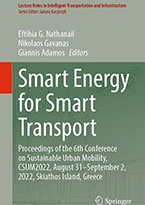
Knese, D. u. L. Fassnacht (2023): Diversification of the bicycle market and consequences for urban infrastructure. In: Springer Nature Switzerland (Hrsg.): Smart Energy for Smart Transport – Proceedings of the 6th Conference on Sustainable Urban Mobility, CSUM2022, Skiathos, Greece, ISBN 978-3-031-23720-1.
EN Integration der Elektromobilität in die Stadtplanung und Straßenraumgestaltung
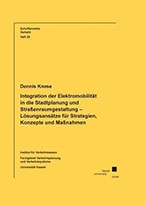
Knese, D. (2019): Integration der Elektromobilität in die Stadtplanung und Straßenraumgestaltung – Lösungsansätze für Strategien, Konzepte und Maßnahmen. Dissertation an der Universität Kassel, Fachbereich Bauingenieur- und Umweltingenieurwesen, ISBN 978-3-7376-0692-9.
EN Acceptance of electric vehicles and new mobility behavior. The example of Rhine-Main region
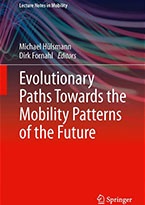
Schäfer, P., K. Schmidt & D. Knese (2014): Acceptance of electric vehicles and new mobility behavior. The example of Rhine-Main region. In: Hülsmann & Fornahl (Hrsg.): Evolutionary Paths towards the Mobility Patterns of the Future. Springer Verlag, Heidelberg, S. 13-19. ISBN 978-3-642-37557-6.
EN Die Modellierung des Radverkehrs
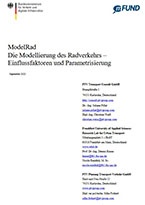
Reinfeld, N., Weiß, Ch., Pillat, J., Knese, D., & Forkert, S. (2023). ModelRad: Die Modellierung des Radverkehrs – Einflussfaktoren und Parametrisierung. Abschlussbericht. https://doi.org/10.48718/158a-6578 .
Knese, D., S. Künbet, Z. Winkler, J. Busse, C. Heer (2023): Wissenschaftliche Analyse der „fahrradfreundlichen Nebenstraßen“ in Frankfurt am Main. Zwischenbericht Oeder Weg. https://doi.org/10.48718/yg3q-pk77.
Reinfeld, N., Weiß, Ch., Pillat, J., Knese, D., & Forkert, S. (2023). ModelRad: Die Modellierung des Radverkehrs – Einflussfaktoren und Parame trisierung. Abschlussbericht. https://doi.org/10.48718/158a-6578.
Knese, D.; L. Fassnacht, S. Künbet, Y. Mashayekhy Fart, S. Henninger (2023): DiMoG - Digitale Schnittstelle zur Förderung klimafreundlicher Mobilitätskonzepte im Güterverkehr. Abschlussbericht. Online-Publikation auf www.relut.de.
Knese, D. (2022): Was die Diversifizierung der Mikromobilität für die Verkehrsplanung und Straßenraumgestaltung bedeutet. In: A. Hildebrandt & C. Silber (Hrsg.): Zukunft Mikromobilität. Wie wir nachhaltig in die Gänge kommen: Ein Rad-Geber. Kirchner-Verlag, S. 198-213. ISBN 978-3-96317-313-4.
Knese, D. (2021): Die FRA UAS wird radmobil! In: VSVI Hessen e.V. Journal 2021, S. 48-50.
Knese, D. (2019): An essential puzzle piece: electromobility’s role in decarbonising energy and transport. In: Friends of Europe: Energy for Development, Brüssel.
Knese, D. & K. Suhr (2018): Innovation Lab on E-Mobility Powered by Renewables in the Caribbean. In: The Cowrie – SIDS Time Magazine, Second Edition 2018, S. 18-21.
Schäfer, P.; D. Knese; A. Hermann; B. Blättel-Mink, D. Dalichau; A. Breitweg; M. Lanzendorf; S. Schubert; T. Prill; S. Groth; U. Hermenau; M. Tandler & M. Tazir (2015): Elektromobilität als Motor für Verhaltensänderung und neue Mobilität. Abschlussbericht des Gesamtvorhabens „Sozialwissenschaftliche und ökologische Begleitforschung in der Modellregion Elektromobilität Rhein-Main“, Frankfurt am Main. ISSN 2363-8133.
Knese, D. (2014): Bedeutung der Elektromobilität für die Stadtplanung. In: Tagungsband zu den 24. Verkehrswissenschaftlichen Tagen, TU Dresden.
Schäfer, P., D. Knese & A. Hermann (2014): Nutzererwartungen, Nutzererfahrungen und kommunale Ansprüche an die Elektromobilität. In: Elektromobilität - Utopie oder Realität? Zwischenfazit zur Begleitforschung in der Modellregion Elektromobilität Rhein-Main, Frankfurt am Main.
Knese, D. (2013): Zukunftsaufgabe Elektromobilität - Umfrage zu kommunalen Herausforderungen und Strategien. In: Stadt und Gemeinde interaktiv, Ausgabe 12-2013, Winkler & Stenzel Verlag, Burgwedel. ISSN 1437-417X.
Schäfer P. & D. Knese (2012): Elektrolöwe 2010 – Der hessische Elektroautofahrer. In: Straßenverkehrstechnik 4/2012, Kirschbaum Verlag, Köln. ISSN 0039-2219.
Schäfer, P., D. Knese (2011): Hessen: Modellland für eine nachhaltige Nutzung von Elektroautos, Abschlussbericht. Online-Publikation auf www.relut.de.







